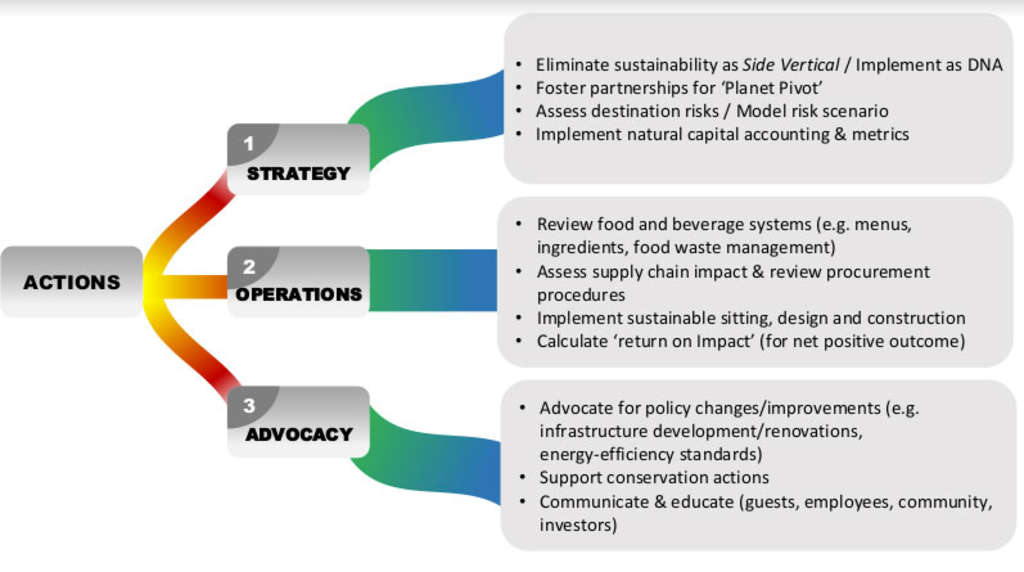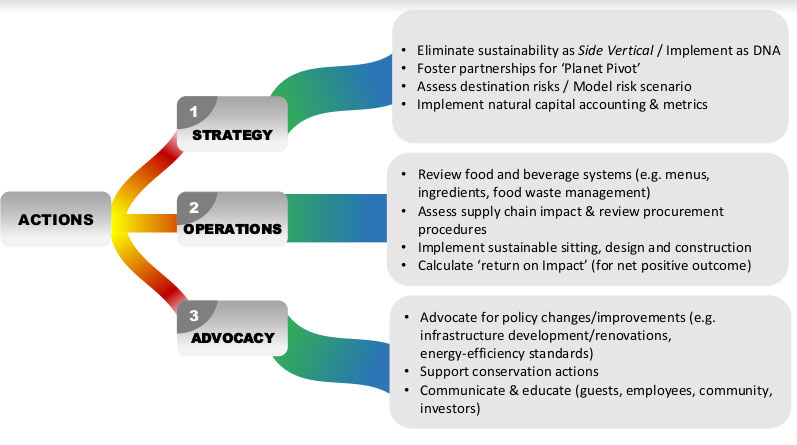2022: The Great Pivot? Hospitality Actions for the Decade of Decarbonisation & Restoration
21 experts shared their thoughts on The Decade of Decarbonisation & Restoration: Needed Actions in Hospitality – a summary of outcomes.
From pledges to on-the-ground actions; the race to decarbonisation is on. This decade is also about restoring ecosystems which are vital to the global hospitality sector. Seasoned experts provide advice on proven and tested solutions and raise new ideas tackling both climate and biodiversity challenges.
According to Net Zero Tracker, net zero commitments and pledges across industries and countries now cover 88% of all emissions and 90% of the global economy [1]. We have officially entered the decade of decarbonisation but it is now the actions and the pace at which we decarbonise that matter. As the Glasgow Climate Pact shows, there is room for improvement here with the global community on a path towards 2.4°C [2] (instead of well-below 2°C as per the Paris Agreement [3]). Since “not all net zero pledges are created equal” [4] and dozens of interpretations are floating around with many focusing on the ‘net’ rather than ‘zero’ [5], it is crucial to have a common language and definitions around the topic of decarbonisation. In the travel, tourism and hospitality sectors, net zero pledges, guidelines and toolkits are available to do just that and include documents such as the Glasgow Declaration on Climate Action in Tourism [6] to the Net Zero Roadmap for Travel & Tourism [6], and the Net Zero Methodology for Hotels [8].
The year 2021 also marked the official start of the United Nations Decade on Ecosystem Restoration [9]. From forest to farmlands, mountains, grasslands and urban environment, nature and ecosystem services are at the center of hospitality processes providing food, filtering water and air and regulating heat in the cities. The industry monetizes the natural beauty of destinations and regularly damages or destroys habitats, sealing ground with infrastructure development. Hospitality developments can be done differently of course, and existing hospitality businesses can prevent, halt and reverse the degradation of ecosystems, paying back into the upkeep and restoration.
Decarbonisation and biodiversity restoration are two sides of the same coin as pointed out by the UN Environment Program (UNEP), “restoration needs to go hand-in-hand with efforts to decarbonize the economy” [10]. Biodiversity and the ‘30 by 30 target’ (protect 30% of land and sea surface by 2030) will be on the 2022 global agenda at COP15 (UN Biodiversity Conference) to be held in Kunming, China (along with other topics from plastic pollution reduction to cutting the rate of species extinction).
So with the decarbonisation and biodiversity restoration imperative in mind, hospitality experts were asked to propose three actions to be implemented in the hospitality industry which have a dual goal of tackling climate change and biodiversity loss.
Following an analysis of all entries, a summary is presented here in the form of a Flow Chart with 3 sections (See Figure 1: Summary Hospitality Actions for the Decade of Decarbonisation & Restoration below).
Following are selected entries, recommendations and quotes from HN World Panel on Sustainability in Hospitality experts under the headings Strategy, Operations and Advocacy
Strategy
The Value of Ecosystems
Frauke Fischer, Founder of Agentur Auf!, biologist and author of multiple books on biodiversity sets the stage explaining that ‘ecosystems store huge amounts of carbon and via photosynthesis turn it into building materials (like timber), (plant) food, coastal protection systems (like mangroves) and much more’. It goes without saying that the entire hospitality value chain depends on functioning and healthy ecosystems.
To ‘understand the impact of your business on species and ecosystems and create expertise/capacity on it’ is a critical step explains Franziska Altenrath, Co-Founder at TUTAKA. Similar to defining the boundaries of a net zero hospitality, understanding, and measuring the value of natural capital, biodiversity and ecosystem services, is essential as explained by Megan Epler Wood, Principal at EplerWood International, who also insists that ‘metrics for climate and natural capital are consistent and are applicable to larger reporting systems’.
Planning and Monitoring Corporate Performance on Biodiversity
For business owners and managers wondering where to start, the International Union for Conservation of Nature (IUCN) developed a guideline (Guidelines for Planning and Monitoring Corporate Biodiversity Performance) supporting businesses in setting goals, selecting indicators as well as providing guidance in collecting, presenting and analyzing corporate performance on biodiversity.
The Planet Pivot
Marloes Knippenberg, CEO of Kerten Hospitality, argues for an ‘ESG-compliant mindset’ going forward and explains that ‘the sustainability 2022 context rests on global partnerships of impact that bring together eco-friendly SMEs, local industry leaders and the young generation buzzing with innovation and ideas that are changing the way we perceive Planet problems’. Knippenberg concludes that ‘if Sustainability becomes part of all companies' DNA, versus a side vertical, we can together drive change throughout’ – a sort of planetary pivot, from words to actions.
Massive Change
Marco Bevolo, Founder of Marco Bevolo Consulting, introduces ‘Life-centered Design’ (and the work by designer Bruce Mau) focusing on designing – but also making decisions – for the “welfare of all of life”[11]. Bevolo argues that the sector needs to ‘grow beyond outdated notions of "experience design" to radically redefine their role in societies’.
Operations
Your impact starts with your supply chain
‘Have your suppliers committed to safeguarding biodiversity?’ asks Jonathon Day, Associate Professor and Graduate Program Director School of Hospitality and Tourism Management at Purdue University. Andreas Koch, Managing Director at blueContec GmbH argues that ‘if you think of the Carbon or Biodiversity footprint of all your suppliers, this is where the real impact lies’. This includes a hard look at food and beverage procurement, furniture, fixtures and equipment (FF&E), operating supplies as well as sitting, design and construction.
JoAnna Abrams, CEO of MindClick, points out that ‘every hotel project uses FF&E and OS&E products that are contributing to our global carbon footprint and degradation of ecosystems’ and consequently, ‘factoring environmental impacts into the performance assessment of products, of design, and of purchasing’ offers tremendous opportunities for change. Along similar lines, Nadia Ibrahim, Head Of Consultancy at Farnek Services LLC, argues to take a hard look at ‘sustainable siting & design & operations to ensure there are no altercations and impact on the natural environment where the hotel is located’. Nicolas Dubrocard, Founder & Director, Audit Diagnostic Solutions Tourism, adds on the topic by asking ‘hotels' owners, developers and architects: could you please stop building sick hotels that monopolize our time and energy to try and make them less impactful?’
On the food and beverage side, Eric Ricaurte, Founder at Greenview, has a clear message ‘1) Offer less beef. 2) Waste less beef. 3) Eat less beef’. Similarly, Bastienne Bernasco, Senior lecturer at Saxion UAS offers three hands-on actions ‘1) plant-rich diets, 2) health and education and 3) reduced food waste’. As a quick-win on the food waste front, Dubrocard, reasons to ‘stop throwing away the resources in the bin’.
ROI – Return on Impact
‘Take the first step today’ says Celine Vadam, Founder & CEO of WE(i) Think, recommends ‘mindful spending’ thereby ‘calculating their ROI not solely based on profit but on overall return and impact for the environment and the people’. Positive impact can be achieved by moving the focus to local resources maintains Arjan van Rheede, Senior Research Fellow in Sustainability at Hotelschool The Hague, where the industry can ‘act locally to increase our resilience’ and ‘act locally to increase our biodiversity’.
Existing and new properties matter
I also argue to take a hard look at the infrastructure pertaining to (1) existing hotel properties as well as the (2) hotel pipeline:
- For existing properties: implement a living wall, rooftop garden and/or re-wild landscapes. Research is unequivocal, the benefits outweigh the costs of implementation and maintenance [12].
- For new properties: enhance biodiversity through blue-green infrastructure. Our built environment, including the surroundings of new hotel properties, is covered in concrete and asphalt. Blue-green infrastructure planning is key, making room for water and vegetation and providing space for fauna, flora and humans to flourish.
Technology to manage the present and predict the future
Dan Ruben, Director, How to Green Your Hotel, advocates for ‘smart building technology’ on the path to decarbonisation, since ‘technology can be an equalizer in terms of its ability to promote a positive impact on the environment’ as discussed by Robert Stevenson, CEO of INTELITY. From conservation of water to energy savings, the data is available on the savings in terms of natural capital of financial resources. Understanding, utilizing, and analyzing data remains a cornerstone of successful sustainability plans. Beyond current operational efficiency, Sam Laakkonen, Contingent Managing Director - Sustainability at Techstars, states the industry needs to ‘deploy technology to predict the future’ where systems can help to identify ‘patterns that cause inefficiencies can provide significant benefits for both decarbonisation and natural ecosystem protection’.
Advocacy
Get your house in order – and tell the world
Sustainability is an intricate component of well-managed properties, so ‘Get your house in order – and tell the world’ argues Jonathon Day, Associate Professor and Graduate Program Director School of Hospitality and Tourism Management at Purdue University. The same advice is proposed by Sarah Habsburg-Lothringen, Tourism Training Specialist & Business Mentor for Small, Independent Hotels who states that ‘generating change that matters should not be hidden from the public eye’. Communication, internal and external matters for an industry that acts as a global-operating agent of change.
Empowerment and biodiversity ambassadors
One more step to take at the start of 2022? ‘Empower your employees to become climate and biodiversity ambassadors’ maintains Andreas Koch, Managing Director at blueContec GmbH and that requires ‘sustainability actions in the field, on a daily basis’ maintains Peter Varga, Assistant Professor at Ecole Hôtelière de Lausanne (EHL). The following generations of hospitality professionals are bound to act as planetary guardians or custodians since universities across the globe are activating sustainability classes and projects, discussing and calculating decarbonization pathways and brainstorming biodiversity metrics that are industry-relevant. As Elena Cavagnaro, Professor of Sustainability in Hospitality and Tourism at Stenden University of Applied Sciences, explains, one of the partnership project at her university aims to ‘harness students' creativity in designing and prototyping regenerative accommodations’.
Conclusion
It is not an easy task to give justice to the depth and scope of recommendations provided by the experts on the topic of actions towards tackling both climate change and biodiversity loss. I can only encourage the reader to take some time and explore all recommendations provided here: https://www.hospitalitynet.org/panel/125000141.html.
References
[1] Net Zero Carbon Tracker (Dec. 05, 2021). Energy & Climate Intelligence Unit (ECIU), Data-Driven EnviroLab (DDL), New, Climate Institute and Oxford Net Zero. https://www.zerotracker.net/
[2] Climate Action Tracker (2021). Glasgow’s 2030 credibility gap: net zero’s lip service to climate action. https://climateactiontracker.org/publications/glasgows-2030-credibility-gap-net-zeros-lip-service-to-climate-action/
[3] UNFCCC (2015). Paris Agreement. https://unfccc.int/sites/default/files/english_paris_agreement.pdf
[4, 5] Dowdall, T. (2021). Science-Based Net-Zero Targets: ‘Less Net, more Zero’. Science-Based Targets. https://sciencebasedtargets.org/blog/science-based-net-zero-targets-less-net-more-zero
[6] One Planet (2021). Glasgow Declaration on Climate Action in Tourism. https://www.oneplanetnetwork.org/programmes/sustainable-tourism/glasgow-declaration
[7] WTTC (2021). A Net Zero Roadpamp for Travel & Tourism. World Travel and Tourism Council & UNEP https://wttc.org/Portals/0/Documents/Reports/2021/WTTC_Net_Zero_Roadmap.pdf
[8] Greenview, Tourism Declares, WTTC, PATA, and Sustainable Hospitality Alliance (2021). Net Zero Methodology for Hotels v1.0. https://greenview.sg/services/netzerohotels/
[9] UNEP & FAO (2021). Decade on Ecosystem Restoration 2021-2030. https://www.decadeonrestoration.org/
[10] UNEP (December 23, 2021). Inside the 10-year race to save the planet. https://www.unep.org/news-and-stories/story/inside-10-year-race-save-planet?s=03
[11] Bruce Mau Studio. (2021). Principles To Change Everything, with Bruce Mau. https://brucemaustudio.com/press/principles-to-change-everything-with-bruce-mau/
[12] Legrand, W. (June 22, 2021). Nature-Based Solutions for Urban Hotel Real Estate. White Paper Series on Sustainable Hospitality in collaboration with Berkeley Capital Group, HospitalityNet, https://www.hospitalitynet.org/opinion/4105089.html
Willy Legrand
Prof, Department of Hospitality, Tourism and Event Management
+49 (0) 2224 9605 209
IU International University of Applied Sciences

